'The Brother From Another Planet,' Kamala Harris And The Fallacy Of Post-Racialism
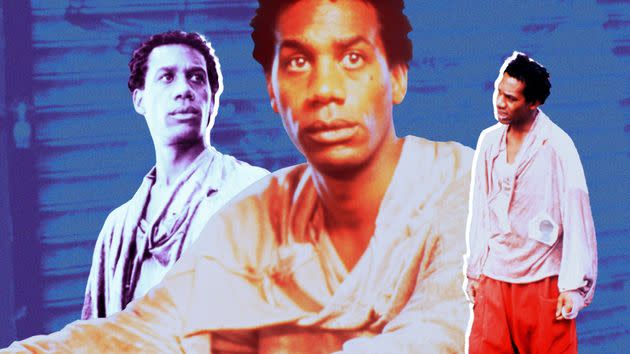
Every few years or so, the term “post-racial” boomerangs back into the zeitgeist, bringing with it the myth of a supposed utopia where racial woes no longer need to be brought up — much less rectified.
Just last month, Salon published a piece suggesting that a statement from presidential candidate Kamala Harris’ nomination acceptance speech, “We have so much more in common than what separates us,” implies that she, too, believes that racial labels only further divide us.
That was published less than a decade after The Atlantic ran a clear-eyed article condemning the fallacy of post-racialism that should have put the kibosh on the whole idea and any remnants of it thereafter.
But this rhetoric can be traced as far back as 1984 (and probably earlier) when The New York Times published an oversimplified “Black folks have much less to complain about now” type of piece because we had presumably overcome most significant hurdles by then. It cited as evidence Rev. Jesse Jackson’s relatively successful presidential campaign, Michael Jackson’s record eight Grammy Awards for “Thriller,” and the debut of “The Cosby Show.” Eddie Murphy had also proven himself as a megastar in “Beverly Hills Cop,” And “Breakin’,” which helped solidify the hip-hop cinematic canon, opened No. 1 at the box office.
But that same year, the low-budget film “The Brother from Another Planet” also opened in theaters, dropping audiences — and its mute, Black male-presenting protagonist from outer space — into Harlem, and offering a far less idyllic view of the “capital of Black America.”
The film barely made an impact at the box office, save for devotees of its writer-director and indie film auteur John Sayles. In its oddball, occasionally funny and eternally poignant way, it reflected the realities of race relations, immigration, police injustice, poverty and the drug epidemic that existed throughout that so-called Black “renaissance.”
“The film didn’t really pick up in terms of popularity until it got on television,” the film’s star, Joe Morton, told me when we hopped on a Zoom call together weeks before the movie’s 40th anniversary on Sept. 7.
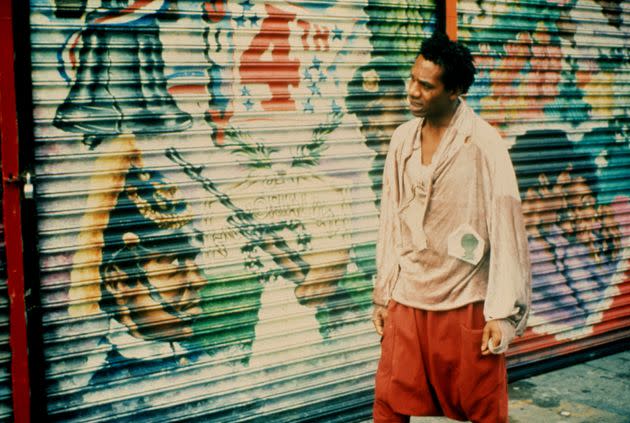
But there was a hunger among some Black moviegoers for stories that reflected their real worlds beyond what was seen in popular blaxploitation films at the time. Morton cites Spike Lee’s “She’s Gotta Have It,” released two years after “Brother,” as another example of a growing fervor for small films about Black experiences that fell outside the typical Hollywood fare.
“I think audiences ran to them because they were going to be good stories,” Morton said. “Both Spike and John are social commentators. So, I think people were very excited because it was going to be about something, even though we were sci-fi — something real.”
That’s partly why the actor, to this day, calls “Brother” his “favorite film,” telling his X followers just two years ago that it’s “because of the challenges the character presented and the story of unrecognized Black talent that it tells, and it was my first lead in a film.”
Morton is known to a newer generation of fans for roles like Whitley’s fiancé on “A Different World,” Silas Stone in “Justice League” or Papa Pope on “Scandal,” but it is the title character in “The Brother From Another Planet,” now considered Sayles’ cult classic, that established him as an unparalleled screen actor.
Soon after his spaceship crash-lands at, fittingly, the Ellis Island immigration center, Morton’s alien alter ego, an enslaved person on his own planet, trudges through the streets of Harlem in tattered clothes, trying to make sense of what he’s seeing. He doesn’t speak and doesn’t understand anything happening around him, but gathers some important truths right away.
Chiefly, while race isn’t particularly a concept the alien recognizes on his planet, he quickly understands that his appearance as a Black man garners specific reactions on Earth.
“He knows the dynamic because, remember, at the beginning of the film, he watches a Black man being arrested,” Morton said, “and he makes the false conclusion of that — Oh my God, that’s what they do here.”
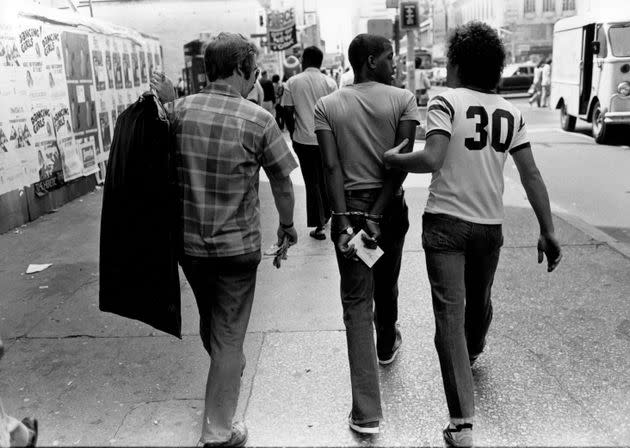
Well, that’s not totally false. 1984 saw a disproportionate number of Black people in New York City being arrested — many without grounds. For an outsider like Morton’s character, you can understand why he later runs whenever he encounters cops.
Plus, as the actor noted, the alien is a fugitive from his planet’s own version of NYC police — de facto slave hunters — desperate to bring him back. His supernatural abilities also allow him to hear the voices, and consequently the experiences, of those who once inhabited the buildings around him. He instantly recognizes their pain as his own.
He also experiences the more compassionate and familiar aspects of being Black in a largely Black space. Despite failed attempts to understand who he is, local bar heads welcome the alien into the fold as their own — an unhoused, harmless Black man they call “The Brother.”
They even find him shelter, jobs like one at the local arcade, and protect him against “the interlopers,” as Morton called them, a pair of white male-presenting characters from The Brother’s planet, played by Sayles himself and David Strathairn, who aim to recapture him.
Impressively without any spoken dialogue, Morton’s Brother is equal parts wide-eyed, empathetic and fascinating to watch, conveying a truth that apparently eludes many still today: Even when race isn’t acknowledged, one still experiences the realities of race and racism. And The Brother, while innocent about many things, understands prejudice all too well.
To prepare for the role, Morton spent a lot of time watching babies and puppies “and anything going through first-time experiences and trying to figure out how to get through those experiences,” he said.
The actor often uses the word “stranger” to emphasize that The Brother is an alien who fits in by nature of what he appears to be, but then again does not. For instance, Morton made a choice that one of the things The Brother wouldn’t be able to understand is the proverbial handshake, a ubiquitous offering particularly among Black men in Harlem.
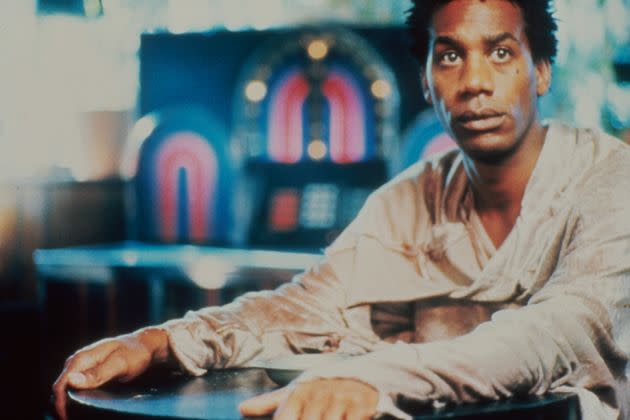
“People would [extend] their hands, and he didn’t know what to do with that, he had no idea what that meant,” Morton explained. “Because, remember, he’s a stranger, supposedly, in a town that he knows what’s going on and he doesn’t. He’s the stranger in a strange land.”
The actor likens his character’s experience to his own as a son of a man whose job was to “integrate the armed forces overseas.”
“He was an officer who would show up racially unannounced,” he explained. “So, basically we were always on the outside looking in. We were the ‘other’ who were invading these army posts.”
Morton supposed that it was because of stories like that — more so than his being born in Harlem, as he and his family were often overseas — that helped him get the role in the first place. He recalled spending a mere 45 minutes chatting with Sayles at his audition, which left the actor with the impression that he hadn’t actually gotten the job.
“I expected that he would do an improv, since the character doesn’t speak,” Morton remembered. “He did not.”
Throughout our conversation, Morton, who often referred to The Brother as “me” or “I” when reflecting on the character, would excitedly interrupt himself to recall a memory about his experience making the film and why it was so meaningful to him. He took me back to the first time he read the script, while starring on the soap opera “Another World,” and feeling instantly giddy about it.
But his agents described The Brother as “a Buster Keaton kind of character,” referring to the filmmaker and actor known in part for his indelible physical comedy during the silent movie era.
“I read the script, loved the script, disagreed with my agents,” he said, “I didn’t think it had anything to do with Buster Keaton.”
It doesn’t, with the one exception that neither speaks. In the case of “Brother,” the audience soon picks up on the fact that while he’s silent, the character’s ability to listen (adding a nod here and there) and quietly empathize is all that people often desire or need.
“So, people start telling you things when you do that,” Morton said. “Because I did it as an experiment when I was around other people. I just would listen, and you find that if you are a good listener, people have a tendency to keep on talking.”
You’re also not going to say anything they’re not going to like, I added.
“That’s right, that’s right,” Morton replied. “Yeah.”
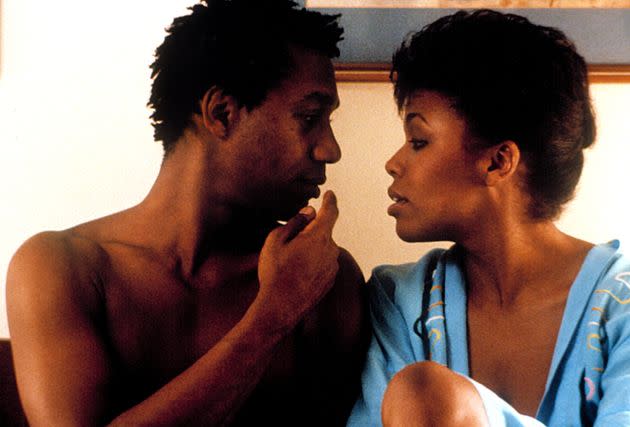
The Buster Keaton comparison also overlooks the nuances of both Morton’s performance and the character Sayles envisioned. “This was not, ‘E.T., go home,’” Morton added, referring to the saccharine 1982 classic “E.T.” “Ultimately in the script, there is no way for him home. So, he has to deal with that idea as well.”
With the appearance of a Black man in 1980s New York City, The Brother realizes that the planet he’s just landed on is not much better than the one he left — that his Black body endangers him, and that he, once again, will have to find unique ways to survive.
None of that is lost on Morton, who was 36 years old by the time “The Brother from Another Planet” hit theaters, 10 years after he earned his first Tony nomination for Broadway’s “Raisin.” Following that acclaim, he pivoted to TV with roles on shows like “Sanford and Son,” “M*A*S*H” and “What’s Happening!!”
“Brother” was a way for him to show a glimpse of what it was like walking the Earth with the appearance of a Black man — even inside of a Black mecca.
“There was an opportunity for an audience who had no idea, really, what it’s like to be in Harlem, to see Harlem through a stranger’s eyes and someone who would be easily accepted into Harlem and sort of see what was going on in that community,” Morton said.
Gentrification and drug distribution threatened to overpower the genuine joy, ambition and potential that also existed there.
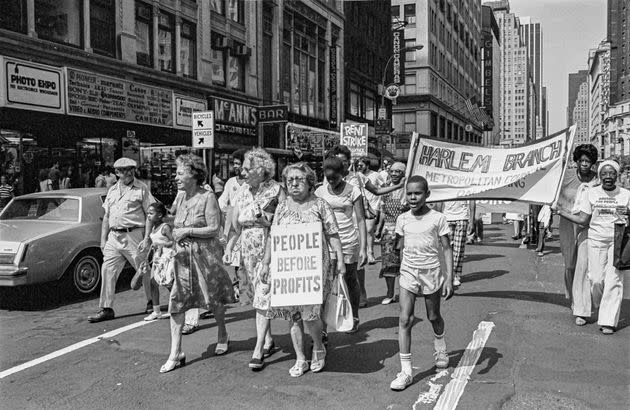
“We have few businesses,” former city councilman Fred Samuels told The Washington Post in 1984. “Banks don’t invest here — there’s still redlining,” he said. “Drug problems continue. The schools aren’t teaching. Young people are joining the ranks of the homeless. We used to build eight subsidized housing projects a year. Under President Reagan, we get next to nothing.”
1984 was a time when white people moved into the Black neighborhood, making it almost unaffordable and unsustainable for the Black folks who had helped make it what it was. It’s hard to tell whether Sayles saw that coming back when he was conceptualizing “Brother.”
Because today, Harlem is a mere shell of its former self, home to an overpriced Whole Foods and white parents raising their families in now-luxury skyrises, where the dream of Black homeownership for many has been crushed. Many Some Black folks have even solemnly braced themselves for the neighborhood’s death.
“There’s a lot more white students who are living in Harlem now than there were when we made the film,” Morton said.
It seems the idea of post-racialism only exacerbates the racial hierarchy and the perception that an all-Black space is somehow dangerous or unattractive. That’s not ideal at all — well, not for everyone.
Few scenes in “The Brother from Another Planet” more acutely highlight that dynamic than when a fast-talking card trickster (“Succession” actor Fisher Stevens) tries to engage Morton’s thoroughly confused character with a rapid series of gimmicks on an NYC subway. For instance, he repeatedly asks The Brother to cut the cards, and the alien is too nervous to go through with it.
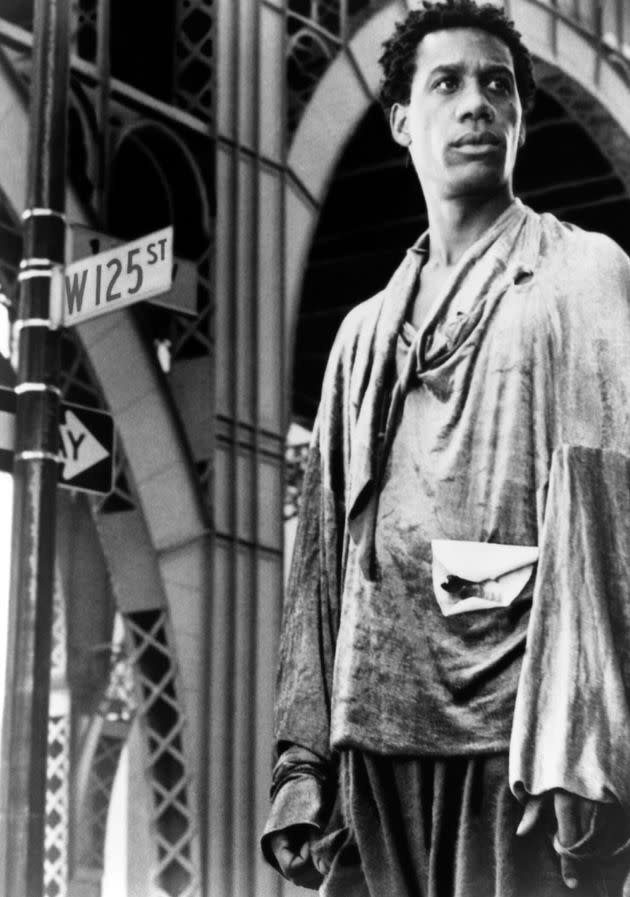
“I’m terrified the entire time because my heart for The Brother was over here,” Morton told me, clutching the side of his chest as he does in the movie.
“So, you see me sitting like this, holding my heart the entire time, because he’s talking in ways I’ve never heard before,” the actor continued. “‘No, do this, do this.’ It’s like, ‘I don’t know what you’re talking about, I’m not sure where this is going,’ and he’s frightened.”
It’s only when Stevens’ character gets to his final act that both the audience and even The Brother understand what he’s pointing to.
“I have another magic trick for you,” the character tells The Brother. “Wanna see me make all the white people disappear?”
At that moment, the subway arrives at 96th Street, the stop before it enters Harlem at 125th Street, and the white characters hustle off the train before the doors close and they’re stuck inside with all the arriving Black passengers.
That scene, immaculate in its pace, execution and payoff, wasn’t even originally in the film. “As I understand it, somebody said to John, ‘Fisher has a card trick you need to see,’” Morton recalled. “So, Fisher showed him the card trick and John put it in the movie.”
It’s hard to imagine the film without it. It excellently portrays white people’s stereotype of a Black space that completely disregards the truth.
Morton points to when The Brother, who can heal people and fix things through physical touch, takes jobs washing cars and fixing radios and video game machines.
“One of the big points was that lots of people in Harlem have lots of talents, and there are no opportunities for them to use those talents and get paid for it,” Morton said. “That plus the underlying drug idea — when the kid sort of overdoses in the apartment building.”
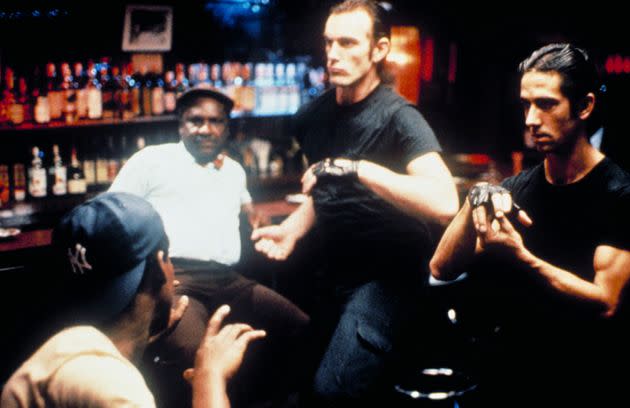
The Brother sees a young Black man inject a substance into his body and, naively, decides to understand what it is — or does — by putting it into his own body. What he ultimately experiences, though, compels him to defeat the drug crisis at its source. And even the sequence when The Brother follows the white drug dealer late at night to his office, as Morton recalled, subtly reflects the role race plays in the epidemic, which the character also grasps.
“[John] makes a real point out of who goes into work at night as other people are coming home,” Morton said. “So that when The Brother even goes in after the drug dealer, the people who are working there are all Black or brown. Again, John is a social commentary person.”
Sayles wrote the screenplay in just 10 days, Morton said. “The writing was so good, people who came on to the set often thought that I was the one who wrote it.”
He said that the filmmaker’s idea for “The Brother from Another Planet” came from a dream the filmmaker had in which he apparently saw old-school sci-fi block letters that read “Assholes in Space.”
“And those were the two guys chasing me,” Morton enthusiastically continued. “Then he saw a Black man in Harlem — realizing that the Black man was not from Harlem, was a stranger. And so he put those two ideas together and formulated ‘Brother from Another Planet.’”
The original working title was “The Brother Who Fell To Earth,” a reference to the 1976 movie starring David Bowie, “The Man Who Fell to Earth.” It changed following an encounter Morton had with a person on the street in Harlem.
“I think we were on Striver’s Row,” Morton recalled. “I was sitting in front of a brownstone and this brother walked up to me, and he said, ‘Ain’t you the brother from ‘Another World?’ And I looked at John, and so it became ‘Brother from Another Planet.’”
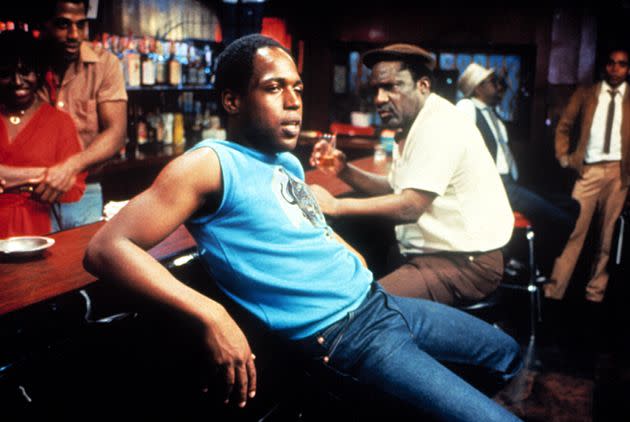
Given Morton’s palpable connection to his role, it really is amazing that a white filmmaker is behind the movie. Not because Sayles isn’t a talented artist, but because scenes like the ones at the bar, where the male characters riff off each other and even share their own feelings on “the other,” feel so honest and intimate.
Morton understands that some of what Sayles reflects in “Brother” is what audiences would see five years later in Lee’s “Do the Right Thing”; the conflicts among ethnic groups on top of the more obviously fraught Black-white relationship. There’s one scene when The Brother’s white employer makes derogatory comments about his Latino staff.
“The guy who hires me to fix all the games,” Morton remembered, “his opinion of who Spanish people are and who Black people are — it’s right out there. That was the perception I think we all had of how people thought of us.”
Long after Morton and I ended our call, I continued to think about how he talked about The Brother and the character’s relationship to race. And why the movie still sticks with Black audiences, in particular, decades later — even though, as the actor put it, “It wasn’t about a Black person from this world or America. It was about someone who was literally an alien.”
Yet the character was cognizant of the nuances of race and being in a space where he could be accepted, protected and even feel love.
And I kept struggling with the idea that anyone, of any race, could challenge those realities — even when a Black-Indian American woman running for president decides to not engage with a question about the significance of her racial identities. Because she understands that their truths should speak for themselves.
Even a six-toed alien from outer space can see that.
“The Brother from Another Planet” is currently streaming on Tubi.


